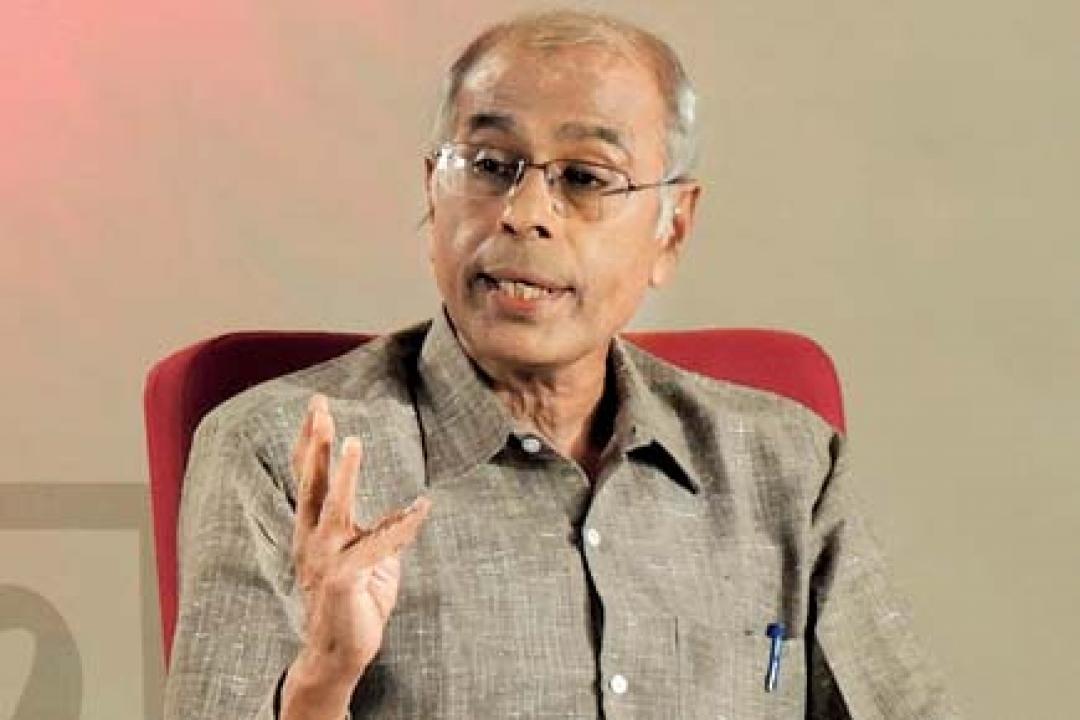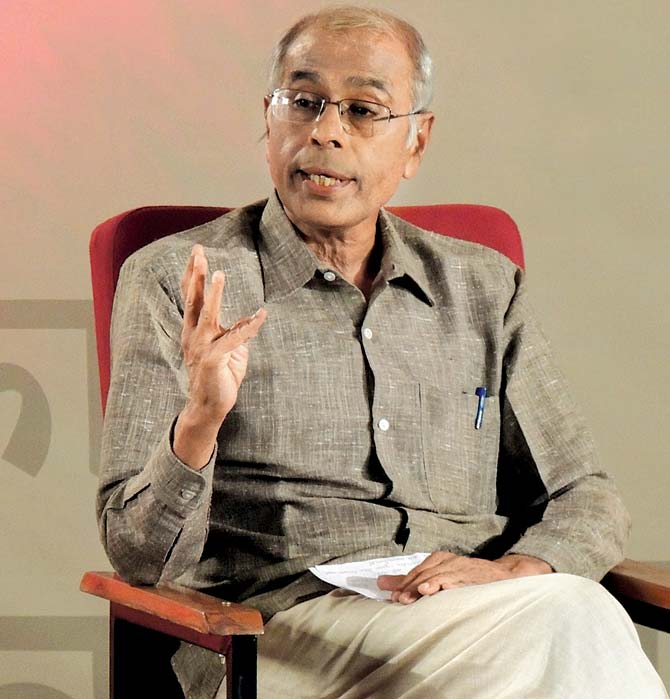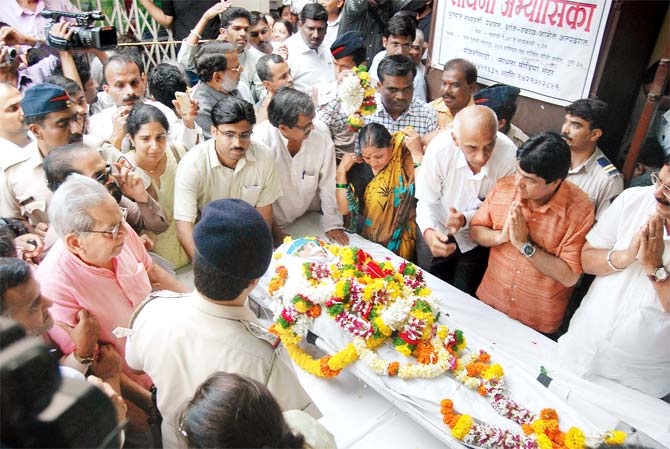Three years after he was shot dead while on a morning walk, rationalist leader Dr Narendra Dabholkar continues to articulate his logic against blind faith in a recently published book on his ripostes against superstitions

Dr Dabholkar is alive

Dr Narendra Dabholkar
ADVERTISEMENT
 Four months before rationalist leader-writer Dr Narendra Dabholkar was gunned down in Pune, he was interviewed in the SM Joshi Socialist Foundation hall on Singhad Road. This was no hurried byte given to a media outlet, but a planned 100 minute-long 'public interview' on April 8, 2013, in which Dabholkar answered 25 precise questions that he had been repeatedly asked since he founded the Maharashtra Andhashraddha Nirmoolan Samiti (Committee to Eradicate Superstition in Maharashtra) in 1989. Each question was devoted three and a half minutes and the interview, held amid a 500 plus audience, was shot without a retake. The chatty style of the interview, its sparkling logic laced with anecdotes, makes for a fresh impactful piece of communication even when Dabholkar is not accessible in person. Commemorating Dabholkar's third death anniversary, the slim book named "Prashna Tumcha Uttar Dabholkaranche" (Your Question, Dabhaolkar's Answer) does justice to Dabholkar's spirit of inquiry and his group's signature anthem: "Prashna Vichara Punha Punha Asech Ka An Tasech Ka; Shikane Kadhi Sampat Nahi, Hou Dya Lakh Chuka..." (Continue to ask questions; ask why this is so and why that is so? Continue Learning, Despite a Million Mistakes).
Four months before rationalist leader-writer Dr Narendra Dabholkar was gunned down in Pune, he was interviewed in the SM Joshi Socialist Foundation hall on Singhad Road. This was no hurried byte given to a media outlet, but a planned 100 minute-long 'public interview' on April 8, 2013, in which Dabholkar answered 25 precise questions that he had been repeatedly asked since he founded the Maharashtra Andhashraddha Nirmoolan Samiti (Committee to Eradicate Superstition in Maharashtra) in 1989. Each question was devoted three and a half minutes and the interview, held amid a 500 plus audience, was shot without a retake. The chatty style of the interview, its sparkling logic laced with anecdotes, makes for a fresh impactful piece of communication even when Dabholkar is not accessible in person. Commemorating Dabholkar's third death anniversary, the slim book named "Prashna Tumcha Uttar Dabholkaranche" (Your Question, Dabhaolkar's Answer) does justice to Dabholkar's spirit of inquiry and his group's signature anthem: "Prashna Vichara Punha Punha Asech Ka An Tasech Ka; Shikane Kadhi Sampat Nahi, Hou Dya Lakh Chuka..." (Continue to ask questions; ask why this is so and why that is so? Continue Learning, Despite a Million Mistakes).

Dabholkar was shot dead in August, 2013, by two gunmen while on a morning walk in Pune. Pic/AFP
The 50-page book (available in the form of a DVD and soon to be released in English) is an apt compilation of the frequently raised objections to rationalists' movements (Maharashtra Andhashraddha Nirmoolan Samiti in particular) which work against miracle healers-ascetics, exploitative Godmen and other forces perpetuating blind faith. As Dr Dabholkar's daughter Mukta puts it rightly, "Any progressive movement flowers when it is aided with articulate and strong thought leadership. Very often, good causes suffer because those who espouse the cause are unable to argue well, in the right words and attitude." She feels the book sets a precedent — it preempts the critics, provides detailed but concise counter arguments and maintains an air of gentleness.
The book appeals to those who are rationalist in their approach, but either have reservations about Maharashtra Andhashraddha Nirmoolan Samiti's stance vis-à-vis religion, or they perceive awareness campaigns as Left-wing propaganda politics. "At this point, Maharashtra faces a peculiar situation. There are well-meaning people who believe in scientific temper; but they want to lead individual lives. They don't want involvement in any community initiative. This book shows them why it is in our collective interest to stand against exploitative practices like black magic, witchcraft, animal sacrifice, past life therapy and channelling with the dead," says Mukta. She says the sampled questions in the book — who decides the dividing line between Faith and Blind Faith?; Why do you zero in only on the Hindu religious customs?; Why is there an increase in the fan following of self-styled gurus in the last 25 years?; How do you rate the social service done by Godmen? — are digestible nuggets, specially aimed at those who do not have the time and inclination to leaf through the extensive literature on the anti-superstition campaign.
"Prashna Tumcha…" marks the beginning of a series of forthcoming publications, the redesigning of the Samiti's website in Hindi, English and Marathi and the September short film festival in New Delhi highlighting the issue of superstition in collaboration with filmmaker Nagraj Manjule's Aatpat Productions. Dabholkar's son Hamid feels each project makes a point — the Dabholkar spirit is alive and the movement has only strengthened with the passage
of time.
Interestingly, Dabholkar had a very amusing take on the passage of time in the context of social activism, informs his interviewer Vinod Shirsath (editor of the Sadhana magazine) who also edited-transcribed the 100-minute footage in "Prashna Tumcha…" Shirsath recalls Dabholkar's wish to live for 125 years. "Giving the example of Mahatma Gandhi, who wanted to live long to accomplish the social tasks he had chalked out for himself, Dabholkar also reiterated that he would require at least 125 years to do his bit against superstition. For that wish of a healthy life, he exercised regularly, ate right, slept at the right time and walked for miles. It is another tragic story that he met death in one morning walk."
Shirsath recalls Dabholkar's unique patience with regard to the pace of social change. "He said the rationalist movement expects behavioural change in people which necessarily reflects after quite some time. He said resistance was natural — be it the resolve against fire crackers or the resolution to conduct less ostentatious marriage ceremonies — because old habits die hard." Dabholkar said the achievements of a reformist anti-superstition group in a country like India (where irrational beliefs are a part of the eco-system for thousands of years) cannot be measured in terms of decades but centuries.
Dabholkar wanted younger people to take over his work, so that he could gain more mobility. He had shared his post-retirement dream of starting a kabaddi academy in Satara. He excelled as a player and had received the Shiv Chhatrapati Yuva Award for Kabaddi in 1987; he always wanted to coach young players. Shirsath and other close friends often visualise Dabholkar as a fighting-fit 90-year-old kabaddi instructor – taking India in a league of her own.
Sumedha Raikar-Mhatre is a culture columnist in search of the sub-text. You can reach her at [email protected]
 Subscribe today by clicking the link and stay updated with the latest news!" Click here!
Subscribe today by clicking the link and stay updated with the latest news!" Click here!







